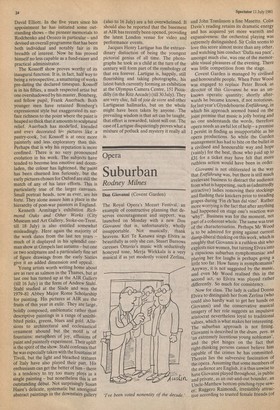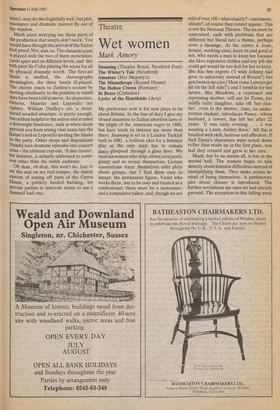Opera
Suburban
Rodney Milnes
Don Giovanni (Covent Garden) The Royal Opera's Mozart Festival, an example of constructive planning that deserves encouragement and support, was launched on Monday with a new Don Giovanni that is, unfortunately, wholly insupportable. Not musically, thank heavens. Kin i Te Kanawa sings Elvira as beautifully as only she can, Stuart Burrows caresses Ottavio's music with seductively honeyed tone, Merja Wirkkala is a very musical if as yet modestly voiced Zerlina, and John Tomlinson a fine Masetto. Colin Davis's reading retains its dramatic energy and has acquired yet more warmth and expansiveness: the orchestral playing was extremely distinguished. Sir Cohn seems to love this score almost more than any other, and watching him conduct `Dalla sua pace', amongst much else, was one of the memorable visual pleasures of the evening. There was little competition from the stage.
Covent Garden is managed by civilised and honourable people. When Peter Wood was engaged to replace Peter Brook as director of this Giovanni he was an unknown operatic quantity; shortly afterwards he became known, if not notorious, for last year's Glyndebourne Entfiihrung, in which his approach seemed based on the joint premise that music is jolly boring and no one understands the words, therefore opera needs an awful lot of help — a premise I persist in finding as insupportable as his opera productions. So while the Garden management has had to bite on the bullet in a civilised and honourable way and hope (vainly) for the best, those who paid up to £31 for a ticket may have felt that more ruthless action would have been in order.
Giovanni is not obliterated in the way that Entfiihrung was, but there is still much irrelevant business to distract the audience from what is happening, such as (admittedly attractive) ladies removing their stockings and flashing their knickers prior to treading grapes during 'Fin ch'han dal vino'. Rather more worrying is the fact that after anything had happened on stage one's reaction was 'why?'. Business was for the moment, not part of a coherent whole. The same was true of the characterisation. Perhaps Mr Wood is to be admired for going against current damp-liberal thinking on this work, which is roughly that Giovanni is a ruthless shit who exploits nice women, but turning Elvira into a rapacious suburban nymphomaniac and playing her for laughs is perhaps going a little too far. How funny is nymphomania? Anyway, it is not suggested by the music, and even Mr Wood realised this in the second act, so Elvira was played rather differently. So much for consistency.
Now for class. The lady is called Donna Elvira to distinguish her from Zerlina (who could also hardly wait to get her hands on Giovanni) and the conservative musical imagery of her role suggests an impulsive aristocrat nevertheless loyal to traditional values, which is what makes her interesting. The suburban approach is not fitting.• Giovanni is described in the dram. pers. as 'an extremely licentious young nobleman', and the plot hinges on the fact that right-thinking persons cannot believe him capable of the crimes he has committed. Therein lies the subversive fascination of the opera. Assuming that some members of the audience are English, it is thus unwise to have Giovanni played throughout, in public and private, as an out-and-out bounder, an Uncle-Matthew bottom-pinching-type sewer; Ruggero Raimondi, irresistibly attractive according to trusted female friends (of mine), may do this frightfully well, but plot, resonance and dramatic interest fly out of the window.
Much more worrying are those parts of the production that simply don't work. You would have thought the arrival of the Statue fool-proof. Not, alas, so. The climactic scene IS played with the two of them motionless, Yards apart and on different levels, and this With poor Sir Colin playing the scene for all its physical dramatic worth. The first-act finale is muffed, the choreography meaningless, the three bands ill-placed. The chorus reacts to Zerlina's scream by moving obediently to the position to which they have been told to move. As characters, Ottavio, Masetto and Leporello are Ciphers. William Dudley's set, a threetiered arcaded structure, is pretty enough, but seldom helpful to the action and at times a downright hindrance, such as when drops Prevent you from seeing vital items like the Statue's nod or Leporello inviting the Masks to the party. Other drops and dispositions blandly turn dramatic episodes into concert arias — the ultimate cop-out. 'Ii mio tesoro', for instance, is actually addressed to someone other than the ruddy audience.
Oh dear, oh dear, this won't do. Just to set the seal on my bad temper, the recent custom of roping off parts of the Opera House, a publicly funded building, for Private parties in intervals seems to me a damned bad one.



































 Previous page
Previous page